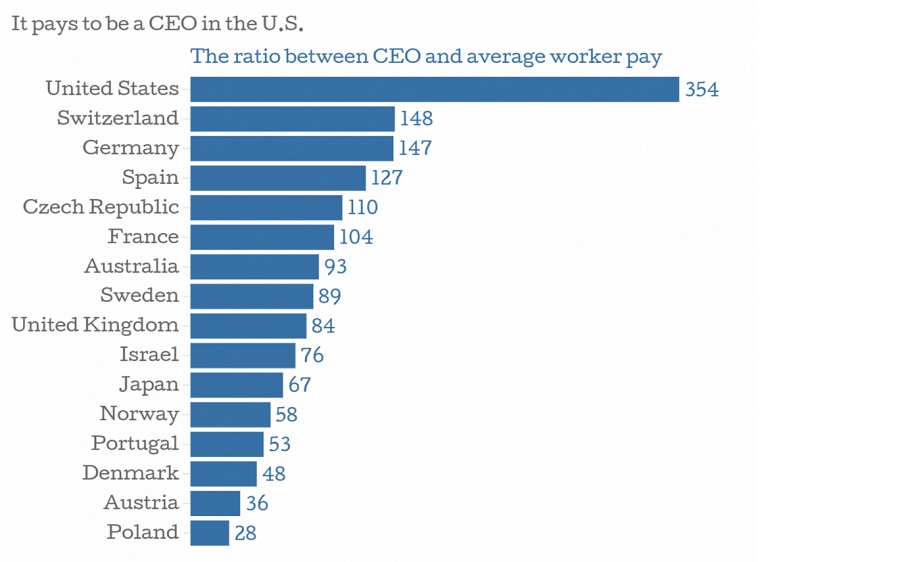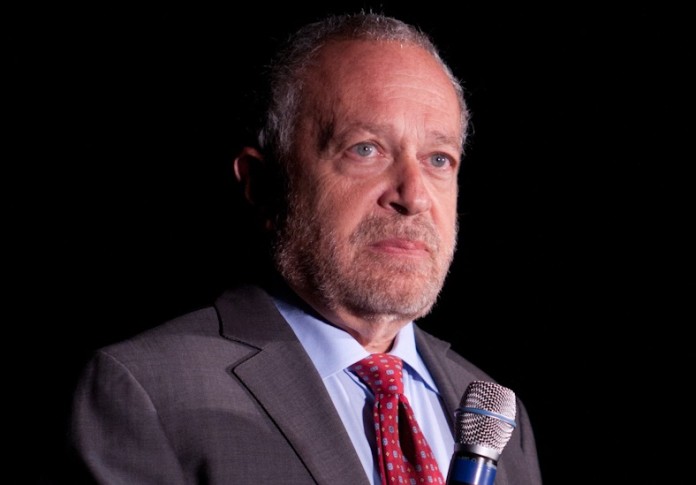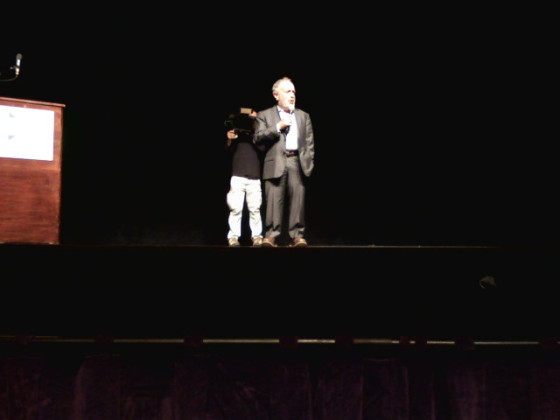Robert B. Reich, former labor secretary in the Clinton administration and current chancellor’s professor of public policy at the University of California at Berkeley and senior fellow at the Blum Center for Developing Economies, spoke this month at the Englert Theatre in Iowa City.
His message was plain: Americans must organize and mobilize. Do not cede the entire system to the moneyed, he said, but create countervailing power. He called for the poorest 90 percent of Americans to come together and for Iowans, in this presidential season, to be a model for the nation.
Reich began by talking about the worry, anxiety and distress that people want to express to him and the way people are losing confidence in the economic system. He touched on the declining economic security in the United States and noted many workers don’t even have basic predictability in their hours.

Reich cited figures showing median household income has dropped and that two-thirds of Americans live from paycheck to paycheck.
In the early 1980s, more and more income and wealth started going to the top, a situation contiuning today and that Reich called “simply not sustainable.” But as income and wealth has gone to the top, so has political power, he said. The richest Americans have gained more and more ability to “influence the rules of the game.” Therefore, the game itself has changed.
Reich outlined three big fallacies. The first myth is the free market. It’s not, “Do you trust the free market, or do you trust government?” he said. “There cannot be a free market without government.”
The myth is that there’s a big division between the market and government. The real issue, said Reich, is “who is making the rules for whom. Do the rules benefit most of us or all of us or the few? Who is the government for?”
There are rules, he said, and the rules come from courts, judges, administrative agencies — in other words, the government. Reich listed some of the rules impacting the free market, such as what we mean by private property or intellectual property.
What should be patentable? he asked, and what are the rules surrounding contracts? What’s a fraudulent sale or insider trading?—the government defines these rules.
“No other country defines it (insider trading) as loosely as we do,” he said. On Wall Street it’s the “coin of the realm” because “Wall Street thrives on insider information.”
The second myth is that we are paid what we are worth. Corporate CEOs earn about 300 times what the average worker earns.

“They must be worth it because they’re earning it,” some people will say, but Reich countered that claim by saying the market is a reflection of who has power. Pay is a reflection of what people are worth in society, he said.
The third myth involves the divisive question how much you want to tax the wealthy and redistribute wealth. Reich said the biggest redistributions are upward distributions to the rich. He refers to these as redistributions of wealth as “pre-distributed upward” because political power in the market structures the market in such a way as to create these hidden upward pre-distributions.
His examples included the internet, prescription drugs and bankruptcy laws.
Americans pay more for the internet than the citizens of any other advanced nation, and yet we have the slowest internet, claimed Reich. In the U.S. 80 percent of us cannot choose among internet providers. There is no competition, so the companies can charge whatever they want to charge. He attributes this to the political power of the internet service providers.
Americans also pay more for prescription drugs. We permit proprietary drug companies to pay off generic drug companies in order to delay release of their generic drugs. We prohibit Americans from getting drugs from other countries.
Politics is not a neutral market source in these arrangements, Reich said. These rules and policy decisions result in the hidden pre-distributions upward.
He noted we had nine major airlines 10 years ago, and now we have four major airlines. The story is the same among for-profit health insurers and in the banking industry. In 1990 five major banks held 10 percent of all the banking assets. By 2007 this number had increased to 25 percent, and today five major banks hold 44 percent of the assets.
Reich calls this situation an implicit government subsidy that gives major banks a competitive advantage over local banks—a hidden pre-distribution upward.
Bankruptcy laws have also changed dramatically over the last 30 years, he said In the past, it was difficult for large companies or the wealthy to claim bankruptcy, but it’s getting easier and easier to do. Reich pointed out that airlines consistently go into bankruptcy in order to get out of their labor contracts, while homeowners underwater on their mortgages can’t use bankruptcy to reorganize their mortgage payments.
Student debt was another example in which it’s very difficult to use bankruptcy to reorganize the debt.
Reich believes that if we’d fix these mostly hidden pre-distributions upward, we wouldn’t have to worry about large redistributions afterwards.
He said almost everyone wants a system that works for almost everybody. People agree that big banks should be broken up, and they are opposed to corporate welfare.
He kept returning to the issue of power and the balance in the economy. He believes that power is what we’ve lost in every domain. He talked of the great legacy of the New Deal and said the biggest thing the New Deal did was offset power through such things as farm cooperatives, labor unions and local banks.
Reich encouraged the audience to “recreate centers of countervailing power.” He called for the bottom 90 percent to come together. He agreed we need to get money out of politics, to reverse Citizen’s United, to push for a single payer system for healthcare, but mostly he championed mobilization and organization and the need for people to see the “reality of the relationship between power and the economy.”
Reich encouraged us all to “get out of our bubbles,” saying we only learn when we talk with people who disagree with us, and people who disagree with us only learn when they talk with us.
“It sharpens our understanding,” he said.
He further challenged Iowans in particular to provide a model for the nation.
“I’m an optimist,” he said, because “I don’t like the alternative.” He said we can’t become cynics and give up on our democracy. If we stop being involved, we are “ceding our entire system to the moneyed,” he said. We must bust the myths and “create a movement to take back our economy and our democracy.”
“There is nothing inevitable about what we are experiencing in this country,” he said. “This is not rocket science, although it seems like it.”
Reich shared a story from a 1936 conversation between a woman and U.S. President Franklin Delano Roosevelt. The story goes that the woman handed him a list of policies and said that she wouldn’t vote for him unless he supported all the policies she’d listed.
FDR’s response was that he agreed with her list but he said, “You must make me.” In other words, Reich said, we must push the government to do what’s in the public interest.
During the question and answer session, Reich was asked about higher education, and reference was made to the recent selection of Bruce Harreld as the new University of Iowa president.
Reich steered clear of commenting specifically on the current tension at the University but spoke about education as a whole and said there is a “disinvestment going on.” He said someone once told him Washington politics is “dog eat dog,” and university politics is exactly the reverse, he said.
“Over-testing is taking the education out of education,” he said and again encouraged voters to organize and mobilize.
“Parents may not be getting the right information,” he said, “but parents and teachers working together can keep school boards on their toes.”
Robert Reich spoke as part of the Iowa City Book Festival and ended the evening by signing copies of his latest book, “Saving Capitalism: For the Many, Not the Few.”




















Robert Reich is a rabid Marxist/Leninist economist. As such, he twists everything to support his ideas and persuade people to respond to greed with a greed of their own. His speeches are intended to stir the passions and convince people that they are being victimized by the moneyed class.
While I do think that there is something wrong with the business model that results in huge profits and great disparity of income, Marxist/Leninist economics has NEVER solved the problem. Not in the former Soviet Union, not in Cuba or Venezuela, or in China.
The American people enjoy a high standard of living because they get an education and work hard, mostly at their own small businesses. Government involvement in the form of regulations robs people of freedom and sucks money out of the economy. Reich’s ideas are the last thing we want because they run counter to American ideas of freedom and liberty.